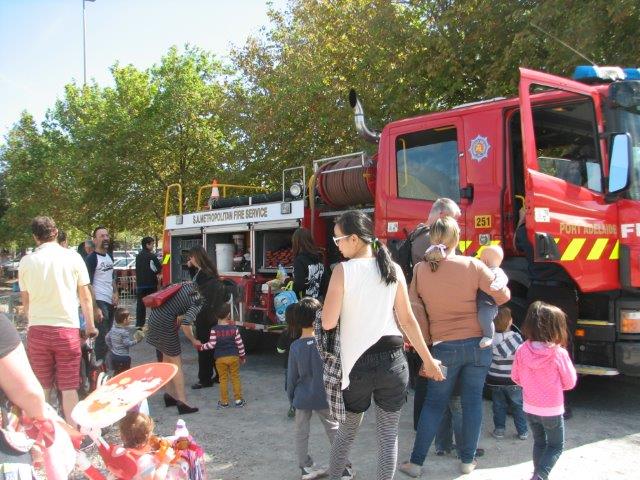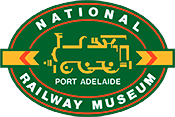Planning Your Visit
National Railway Museum
Located within the heritage precinct of Lipson Street in Port Adelaide
The National Railway Museum is located within the heritage precinct of Lipson Street in Port Adelaide. The Museum features locomotives, railway carriages, a train ride, exhibits and displays housed within two large fully enclosed pavilions and around the extensive Museum grounds. Be sure to check our What’s On page for information about our Events and Exhibitions.
Please be advised that for safety and security reasons, many of our priceless and irreplaceable carriages and locomotives are not accessible.
Conditions of Entry
To enter the Museum, visitors must adhere to the following conditions:
- abide by all reasonable and lawful directions given by National Railway Museum staff, Duty Managers and volunteers
- ensure children under 16 years of age are accompanied by an adult and are actively supervised at all times
- conduct themselves and children in a manner which does not interfere, disrupt or offend other persons visiting the Museum
- do not touch, or in any other way, interfere with collection objects or displays unless indicated
- no climbing on exhibits – no exceptions
- refrain from running
- no consuming of food or drinks in the pavilions
- no dogs allowed – Assistance dogs excepted
- no smoking or vaping
- no skateboards, roller blades, push bikes or scooters
- no alcohol – conditions may apply for management approved functions
- drones are not permitted
Safety and security
- be aware of edges of paths/paving
- use hand rails where provided
- stow bicycles in the bicycle racks provided
- be aware of safety signage ‘mind the gap’
- be cautious when walking on steps
- do not enter exhibits marked ‘fitted with sensor alarms’
- Please note the Museum operates CCTV cameras throughout the Museum site
Photo/Film
- photography and filming for commercial purposes is not permitted, unless prior permission has been acquired from the Museum management
First Aid/AED is available
What's on offer at the Museum
How to get here
Access and facilities
Group and school bookings
More to see and do
What’s on offer at the Museum:
Train Rides
Take the family on a ride around the Museum site on our free small train ride, included in price of Museum admission. Trains generally run once every half hour.
Party
Host your kid’s next birthday party in the Cafeteria Car, includes free train rides. See the Birthday Parties page for more information.
Museum Shop
The Museum Shop has a range of railway books, DVD’s, souvenirs, toys, drinks and ice creams.
Model Railway
Displays
Steam and diesel locomotives are on display, as well as royal carriages, brake vans, passenger cars, maintenance vehicles, carriages from the Tea and Sugar Train, and a range of railway ephemera. Explore the mechanical and social history of the railways, and try out our train simulator!
Archive
Tea and Sugar Train
Push and Pull
How to get to the National Railway Museum in Adelaide
To help you plan your bus or train trip to the Museum visit the Adelaide Metro site, which includes timetables and a journey planner.
By Rail
The Museum is about a 3 minute walk from the Port Dock Railway Station on the Outer Harbor Line. The Museum is directly adjacent to the station.
By Bus
For bus and train timetables, refer to: https://adelaidemetro.com.au
Cycling and Walking
The Museum is located in central Port Adelaide and the route is well signposted. Cycling or walking is an ideal way to see the many attractions in Port Adelaide.
By Car
From Adelaide via Port Road (Route A7)
From Glenelg via Tapleys Hill Road (Route A15) or Military Road
From northern suburbs via Port River Expressway (A9)
Parking
There is free parking adjacent to the Museum and in nearby streets, however please be aware that this parking is shared with the other residents and businesses around the Port. The car park has a three hour limit.
Access and Facilities
Access and Facilities
- Accessible parking is available in the car park, near the Museum Shop
- Wheelchairs are available free of charge, please enquire with the Shop
- We have wheelchair accessible toilets
- Support dogs are also welcome
- We provide pass out tickets
Dogs
- Sorry, only support dogs are allowed on the Museum site
- Dogs are allowed on the Semaphore Train, but must be on a lead and under full control. Dogs travel free
NRM Visual Narrative
- This PDF is a visual narrative of the Museum, to support our visitors with autism
Facilities for Parents of Young Children
- A change table is available in the women’s toilets and in the accessible toilet
- The Museum does not currently have a dedicated breastfeeding area, however breastfeeding is welcome at the Museum. There are seating areas located around the Museum site
Food and drink
- Vending machines onsite
- Ice creams in the shop
- Several seating areas available
Group and School Bookings
For group and school bookings please contact the Shop directly by phone: 08 8341 1690.
Groups must be a minimum of 10 people.
All group bookings are subject to our Conditions of Entry to the Museum. The Museum reserves the right to suspend any group booking at any time, including after arrival onsite.

More to See and Do
The Port Adelaide area boasts the following attractions, which you can combine with a visit to the National Railway Museum:
There are also pubs, restaurants, cafes and art galleries to visit.
Port Adelaide Visitor Information Centre
For helpful and knowledgeable information about where to stay, what to see, do and experience in the Port Adelaide region visit the Port Adelaide Information Centre on Commercial Road, Port Adelaide; housed in the historic site of the former Port Adelaide Police Station.
